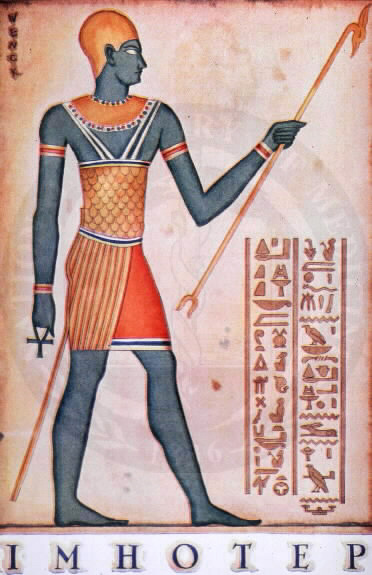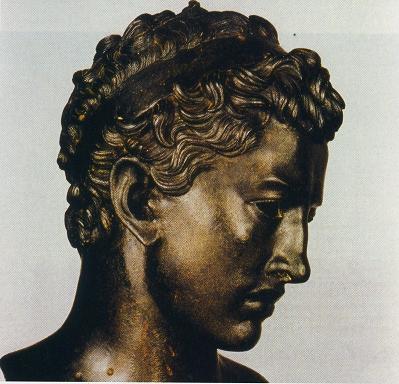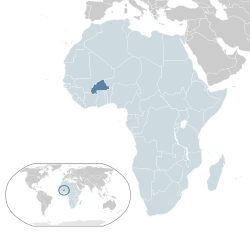Imhotep




Of the non royal population of Egypt, probably one man is known better than all others. So successful was Imhotep (Imhetep, Greek Imouthes) that he is one of the world's most famous ancients, and his name, if not his true identity, has been made even more famous by various mummy movies. Today, the world is probably much more familiar with his name than that of his principal king,Djoser. Imhotep, who's name means "the one that comes in peace". existed as a mythological figure in the minds of most scholars until the end of the nineteenth century when he was established as a real historical person.
He was the world's first named architect who built Egypt's first pyramid, is often recognized as the world's first doctor, a priest,. scribe, sage, poet, astrologer, and a vizier and chief minister, though this role is unclear, to Djoser (reigned 26302611 BC), the second king of Egypt's third dynasty. He may have lived under as many as four kings. An inscription on one of that kings statues gives us Imhotep's titles as the "chancellor of the king of lower Egypt", the "first one under the king", the "administrator of the great mansion", the "hereditary Noble", the "high priest of Heliopolis", the "chief sculptor", and finally the "chief carpenter".
Of the details of his life, very little has survived though numerous statues and statuettes of him have been found. Some show him as an ordinary man who is dressed in plain attire. Others show him as a sage who is seated on a chair with a roll of papyrus on his knees or under his arm. Later, his statuettes show him with a god like beard, standing, and carrying the ankh and a scepter.

Inscription with the names of Netjerikhet (Djoser) and Imhotep
Imhotep may have been born in Ankhtow, a suburb of Memphis early in Egyptian history. However, other classical writers suggested that he was from the village of Gebelein, south of ancient Thebes. His father might have been an architect named Kanofer. His mother could have been Khreduonkh, who probably belonged to the province of Mendes, and he may have had a wife named Ronfrenofert but none of this is by any means certain. As a commoner at birth, he rose through the ranks quickly due to his genius, natural talents and dedication.
As the High Priest of Heliopolis, he would have been one of the chief priest of Lower (northern) Egypt. Even though Egypt's capital may have been located at Memphis, it is likely during this period that Heliopolis was recognized as the religious capital of Egypt.
As a builder, Imhotep is the first master architects who we know by name. He is not only credited as the first pyramid architect, who built Djoser's Step Pyramid complex at Saqqara, but he may have had a hand in the building of Sekhemkhet's unfinished pyramid, and also possibly with the establishment of the Edfu Temple, but that is not certain. The Step Pyramid remains today one of the most brilliant architecture wonders of the ancient world and is recognized as the first monumental stone structure.

Imhotep's best known writings were medical text. As a physician, Imhotep is believed to have been the author of the Edwin Smith Papyrus in which more than 90 anatomical terms and 48 injuries are described. He may have also founded a school of medicine in Memphis, a part of his cult center possibly known as "Asklepion, which remained famous for two thousand years. All of this occurred some 2,200 years before the Western Father of Medicine Hippocrates was born.
Sir William Osler tells us that Imhotep was the:
"..first figure of a physician to stand out clearly from the mists of antiquity." Imhotep diagnosed and treated over 200 diseases, 15 diseases of the abdomen, 11 of the bladder, 10 of the rectum, 29 of the eyes, and 18 of the skin, hair, nails and tongue. Imhotep treated tuberculosis, gallstones, appendicitis, gout and arthritis. He also performed surgery and practiced some dentistry. Imhotep extracted medicine from plants. He also knew the position and function of the vital organs and circulation of the blood system. The Encyclopedia Britannica says, "The evidence afforded by Egyptian and Greek texts support the view that Imhotep's reputation was very respected in early times. His prestige increased with the lapse of centuries and his temples in Greek times were the centers of medical teachings."
Along with medicine, he was also a patron of architects, knowledge and scribes. James Henry Breasted says of Imhotep:
"In priestly wisdom, in magic, in the formulation of wise proverbs; in medicine and architecture; this remarkable figure of Zoser's reign left so notable a reputation that his name was never forgotten. He was the patron spirit of the later scribes, to whom they regularly poured out a libation from the water-jug of their writing outfit before beginning their work.
Imhotep is one example of the "personality cult" of Kemet, whereby a learned sage or otherwise especially venerated person could be deified after death and become a special intercessor for the living, much as the saints of Roman Catholicism. About 100 years after his death, he was elevated as a medical demigod. In about 525, around 2,000 years after his death, he was elevated to a full god, and replaced Nefertum in the great triad at Memphis. In the Turin Canon, he was known as the "son of Ptah". Imhotep was, together with Amenhotep, the only mortal Egyptians that ever reached the position of full gods. He was also associated with Thoth, the god of wisdom, writing and learning, and with the Ibises, which was also associated with Thoth.
We are told that his main centers of worship were in the Ptolemaic temple to Hathor atf Dier el-Medina and at Karnak in Thebes, where he was worshipped in conjunction with Amenhotep-Son-of-Hapu, a sanctuary on the upper terrace of the temple at Deir el-Bahari, at Philae where a chapel of Imhotep stands immediately in front of the eastern pylon of the temple of Isis and of course, at Memphis in Lower (northern) Egypt, where a temple was erected to him near the Serapeum. At saqqara, we are told that people bought offerings to his cult center, including mummified Ibises and sometimes, clay models of diseased limbs and organs in the hope of being healed.
Read more: http://www.touregypt.net/featurestories/imhotep.htm#ixzz2sr4sipcK





 The plan worked so well that in no time at all most of present day Iraq, Bahrain and parts of Iran came under their rule.
The plan worked so well that in no time at all most of present day Iraq, Bahrain and parts of Iran came under their rule. these brothas man... I don't think we would have it in us today.
these brothas man... I don't think we would have it in us today. 









